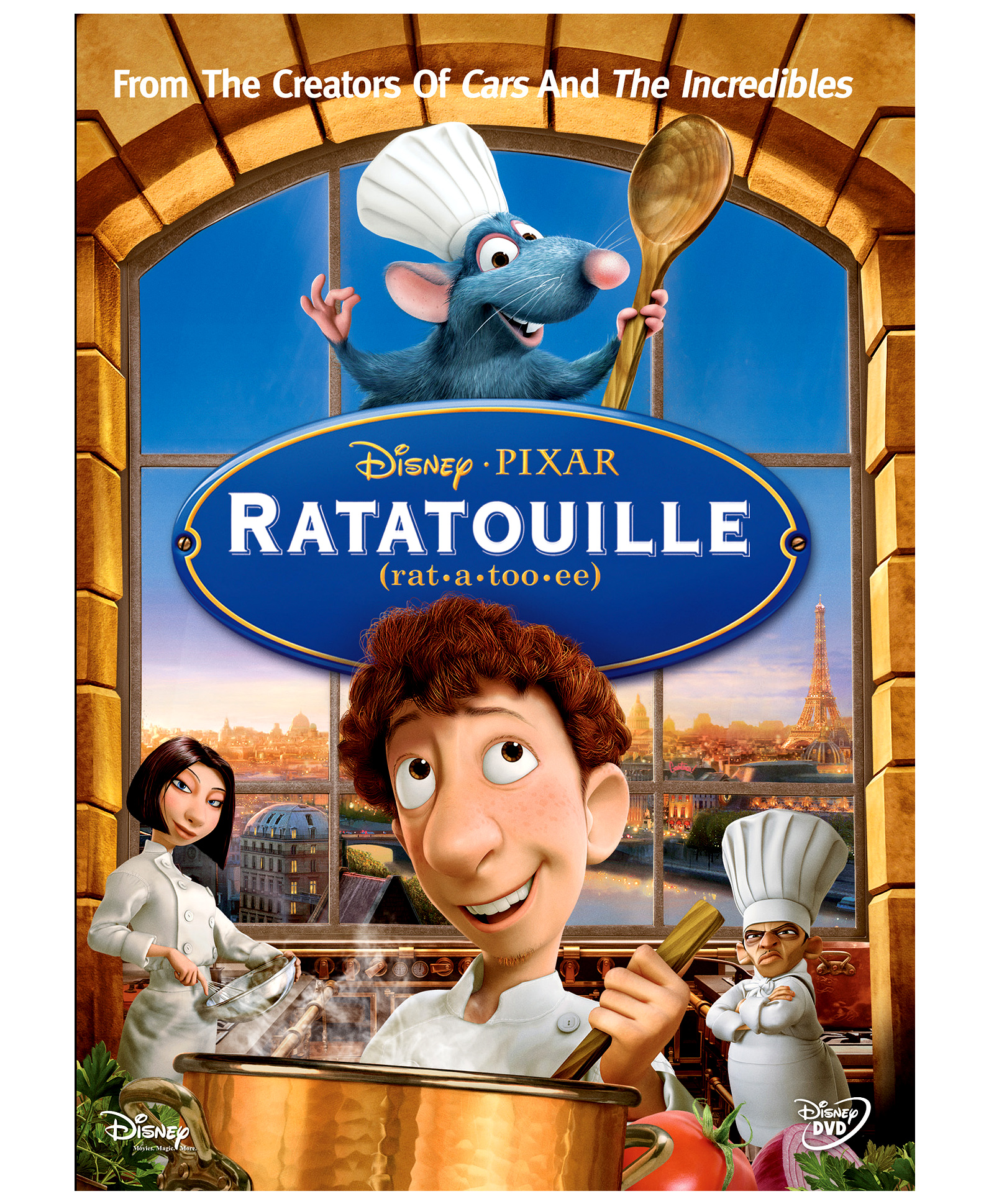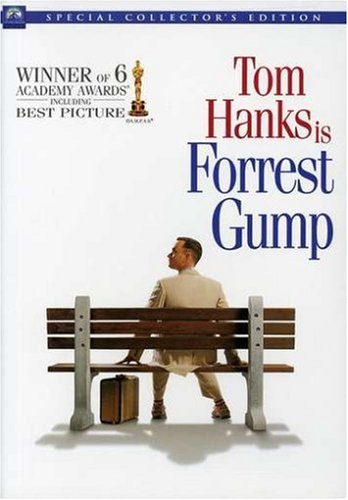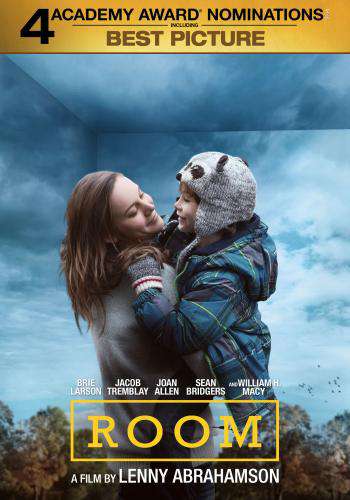The next Genre Reading Group meeting will be on Tuesday, December
27 at 6:30pm. Join us for one of our
biannual Salon Discussion, where there is no assigned topic. Bring whatever you’d like to share with the
group! The library will be on holiday hours
and will close at 6 but I will be here to let you in and share books with you!
The threat of weather dampened (if you’ll forgive the pun) attendance
tonight, but several people emailed their selections to me and my 3 year-old
godson made a surprise visit to GRG (who knew he had such a love and
knowledge for films that won awards for Best Animated Feature?) so here we go
with Academy Award-winning films! (all review blurbs are from
www.rottentomatoes.com)

Ratatouille (Best Animated Feature) (released 2007)
In the hilarious new animated-adventure, Ratatouille, a rat
named Remy dreams of becoming a great chef despite his family's wishes and the
obvious problem of being a rat in a decidedly rodent-phobic profession. When
fate places Remy in the city of Paris, he finds himself ideally situated
beneath a restaurant made famous by his culinary hero, Auguste Gusteau. Despite
the apparent dangers of being an unwanted visitor in the kitchen at one of
Paris' most exclusive restaurants, Remy forms an unlikely partnership with
Linguini, the garbage boy, who inadvertently discovers Remy's amazing talents.
They strike a deal, ultimately setting into motion a hilarious and exciting
chain of extraordinary events that turns the culinary world of Paris upside
down. Remy finds himself torn between following his dreams or returning forever
to his previous existence as a rat. He learns the truth about friendship,
family and having no choice but to be who he really is, a rat who wants to be a
chef.

Braveheart (Best Picture, Best Director, Best
Cinematography, Best Sound Editing, Best Makeup) (released 1995)
Mel Gibson, long-time heartthrob of the silver screen, came
into his own as a director with Braveheart, an account of the life and times of
medieval Scottish patriot William Wallace and, to a lesser degree, Robert the
Bruce's struggle to unify his nation against its English oppressors. The story
begins with young Wallace, whose father and brother have been killed fighting
the English, being taken into the custody of his uncle, a nationalist and
pre-Renaissance renaissance man. He returns twenty years later, a man educated
both in the classics and in the art of war. There he finds his childhood
sweetheart Murron (Catherine McCormack), and the two quickly fall in love.
There are murmurs of revolt against the English throughout the village, but
Wallace remains aloof, wishing simply to tend to his crops and live in peace.
However, when his love is killed by English soldiers the day after their secret
marriage (held secretly so as to prevent the local English lord from exercising
the repulsive right of prima noctae, the privilege of sleeping with the bride
on the first night of the marriage), he springs into action and single-handedly
slays an entire platoon of foot soldiers. The other villagers join him in
destroying the English garrison, and thus begins the revolt against the English
in what will eventually become full-fledged war. Wallace eventually leads his
fellow Scots in a series of bloody battles that prove a serious threat to
English domination and, along the way, has a hushed affair with the Princess of
Wales (the breathtaking Sophie Marceau) before his imminent demise. For his
efforts, Gibson won the honor of Best Director from the Academy; the movie also
took home statuettes for Best Picture, Cinematography, Makeup, and Sound
Effects. ~ Jeremy Beday, Rovi

Forrest Gump (Best Picture, Best Actor in a Leading Role,
Best Director, Best Visual Effects, Best Adapted Screenplay, Best Film Editing)
(released 1994)
"Stupid is as stupid does," says Forrest Gump
(played by Tom Hanks in an Oscar-winning performance) as he discusses his
relative level of intelligence with a stranger while waiting for a bus. Despite
his sub-normal IQ, Gump leads a truly charmed life, with a ringside seat for
many of the most memorable events of the second half of the 20th century.
Entirely without trying, Forrest teaches Elvis Presley to dance, becomes a
football star, meets John F. Kennedy, serves with honor in Vietnam, meets
Lyndon Johnson, speaks at an anti-war rally at the Washington Monument, hangs
out with the Yippies, defeats the Chinese national team in table tennis, meets
Richard Nixon, discovers the break-in at the Watergate, opens a profitable
shrimping business, becomes an original investor in Apple Computers, and
decides to run back and forth across the country for several years. Meanwhile,
as the remarkable parade of his life goes by, Forrest never forgets Jenny
(Robin Wright Penn), the girl he loved as a boy, who makes her own journey
through the turbulence of the 1960s and 1970s that is far more troubled than
the path Forrest happens upon. Featured alongside Tom Hanks are Sally Field as
Forrest's mother; Gary Sinise as his commanding officer in Vietnam; Mykelti
Williamson as his ill-fated Army buddy who is familiar with every recipe that
involves shrimp; and the special effects artists whose digital magic place
Forrest amidst a remarkable array of historical events and people. ~ Mark
Deming, Rovi

The Apartment (Best Picture, Best Director, Best Writing
(Original Screenplay), Best Film Editing, Best Art Direction-Set Decoration
(Black & White) (released 1960)
Widely regarded as a comedy in 1960, The Apartment seems
more melancholy with each passing year. Jack Lemmon plays C.C. Baxter, a
go-getting office worker who loans his tiny apartment to his philandering
superiors for their romantic trysts. He runs into trouble when he finds himself
sharing a girlfriend (Shirley MacLaine) with his callous boss (Fred MacMurray).
Director/co-writer Billy Wilder claimed that the idea for The Apartment stemmed
from a short scene in the 1945 romantic drama Brief Encounter in which the
illicit lovers (Trevor Howard and Celia Johnson) arrange a rendezvous in a
third person's apartment. Wilder was intrigued about what sort of person would
willingly vacate his residence to allow virtual strangers a playing field for
hanky panky. His answer to that question wound up winning 6 Academy Awards,
including Best Picture, Best Director, and Best Original Screenplay. The
Apartment was adapted by Neil Simon and Burt Bacharach into the 1969 Broadway
musical Promises, Promises. ~ Hal Erickson, Rovi

Street Angel (Best Actress) (released 1928)
Fox's follow-up to Seventh Heaven, The Street Angel reunited
stars Charles Farrell and Janet Gaynor with director Frank Borzage. The action
begins in Naples, as poverty-stricken Maria (Gaynor) steals medicine for her
ailing mother. Now a fugitive from justice, Maria escapes by joining a
travelling carnival, where she meets and falls in love with portrait painter
Angelo (Charles Farrell). Impressed by her ethereal beauty, Angelo asks the
girl to pose for his portrait of the Madonna. But when she's suddenly arrested,
the disillusioned Angelo sinks into depravation. Released from prison, Maria
sees her portrait in a church and is inspired to seek out Angelo. Explaining
the circumstances of her arrest, Maria saves Angelo from his sordid
surroundings, inspiring him to return to painting -- and, not surprisingly, to
propose marriage. Heavily influenced by the "Germanic" style then in
vogue, Street Angel lacked the simplicity and sincerity of Sunrise but managed
to post a profit all the same.

Klute (Best Actress) (released 1971)
The first part of his "paranoia trilogy," Alan J.
Pakula's 1971 thriller details the troubled life of a Manhattan prostitute
stalked by one of her tricks. Investigating the disappearance of his friend Tom
Gruneman (Robert Milli), rural Pennsylvania private eye John Klute (Donald
Sutherland) follows a lead provided by Gruneman's associate Peter Cable
(Charles Cioffi) to seek out a call girl who Gruneman knew in New York City.
The call girl is Bree Daniels (Jane Fonda), an aspiring actress who turns
tricks for the cash and to be free of emotional bondage. Klute follows Bree's
every move, observing the city's decadence and her isolation, eventually
contacting her about Gruneman. Bree claims not to know Gruneman, but she does
reveal that she has received threats from a john. As Bree becomes involved in
Klute's search and realizes that she is in danger, she reluctantly falls in
love with Klute, despite her wish to remain unattached to any man. When she
finally comes face to face with the killer, however, she is forced to
reconsider her detached urban life.

Room (Best Actress) (released 2015)
Both highly suspenseful and deeply emotional, ROOM is a
unique and touching exploration of the boundless love between a mother and her
child. After 5-year-old Jack (Jacob Tremblay) and his Ma (Brie Larson) escape
from the enclosed surroundings that Jack has known his entire life, the boy
makes a thrilling discovery: the outside world. As he experiences all the joy,
excitement, and fear that this new adventure brings, he holds tight to the one
thing that matters most of all--his special bond with his loving and devoted
Ma.

The Wizard of Oz (Best Song, Best Original Score) (released 1939)
L. Frank Baum's classic tale comes to magisterial
Technicolor life! The Wizard of Oz stars legendary Judy Garland as Dorothy, an
innocent farm girl whisked out of her mundane earthbound existence into a land
of pure imagination. Dorothy's journey in Oz will take her through emerald
forests, yellow brick roads, and creepy castles, all with the help of some
unusual but earnest song-happy friends.

Gone With the Wind (Best Picture, Best Director, Best Actress, Best Adapted Screenplay, Best Supporting Actress, Best Cinematogrphy (Color), Best Film Editing, Best Art Direction) (released 1939)
Gone With the Wind boils down to a story about a spoiled
Southern girl's hopeless love for a married man. Producer David O. Selznick
managed to expand this concept, and Margaret Mitchell's best-selling novel,
into nearly four hours' worth of screen time, on a then-astronomical
3.7-million-dollar budget, creating what would become one of the most beloved
movies of all time. Gone With the Wind opens in April of 1861, at the palatial
Southern estate of Tara, where Scarlett O'Hara (Vivien Leigh) hears that her casual
beau Ashley Wilkes (Leslie Howard) plans to marry "mealy mouthed"
Melanie Hamilton (Olivia de Havilland). Despite warnings from her father
(Thomas Mitchell) and her faithful servant Mammy (Hattie McDaniel), Scarlett
intends to throw herself at Ashley at an upcoming barbecue at Twelve Oaks.
Alone with Ashley, she goes into a fit of histrionics, all of which is
witnessed by roguish Rhett Butler (Clark Gable), the black sheep of a wealthy
Charleston family, who is instantly fascinated by the feisty, thoroughly
self-centered Scarlett: "We're bad lots, both of us." The movie's
famous action continues from the burning of Atlanta (actually the destruction
of a huge wall left over from King Kong) through the now-classic closing line,
"Frankly, my dear, I don't give a damn." Holding its own against
stiff competition (many consider 1939 to be the greatest year of the classical
Hollywood studios), Gone With the Wind won ten Academy Awards, including Best
Picture, Best Director, Best Screenplay, Best Actress (Vivien Leigh), and Best
Supporting Actress (Hattie McDaniel, the first African-American to win an
Oscar). The film grossed nearly 192 million dollars, assuring that, just as he
predicted, Selznick's epitaph would be "The Man Who Made Gone With the
Wind." ~ Hal Erickson, Rovi

Wuthering Heights (Best Cinematography: Black & White) (released 1939)
Growing up together in 19th-century Yorkshire, Heathcliff
and Cathy form a deep bond. In young adulthood, Cathy wounds the penniless
Heathcliff by marrying into wealth, and his obsession with revenge leads to
tragedy. Laurence Olivier is brilliant as the brooding Heathcliff in this
poetic adaptation of Emily Bronte's novel.
My 3 year old godson Henry visited the boardroom while I
waited for participants and so I engaged him in his first bookclub discussion, on
the various merits of the relatively recent Academy Award for Best AnimatedFeature.
He said he did not like Shrek (the first recipient in 2001)
because it was scary.

Once upon a time, in a far away swamp, there lived an ornery
ogre named Shrek whose precious solitude is suddenly shattered by an invasion
of annoying fairy tale characters. There are blind mice in his food, a big, bad
wolf in his bed, three little homeless pigs and more, all banished from their
kingdom by the evil Lord Farquaad. Determined to save their home--not to
mention his own--Shrek cuts a deal with Farquaad and sets out to rescue the
beautiful Princess Fiona to be Farquaad's bride. Accompanying him on his
mission is wisecracking Donkey, who will do anything for Shrek... except shut
up. Rescuing the Princess from a fire-breathing dragon may prove the least of
their problems when the deep, dark secret she has been keeping is revealed.
He said his mom’s (she was not so enthusiastic when I asked her about it) favorite movie on the list was Happy Feet
(2006),

In the world of the emperor penguin, a simple song can mean
the difference between a lifetime of happiness and an eternity of loneliness.
When a penguin named Mumble is born without the ability to sing the romantic
song that will attract his soul mate, he'll have to resort to some fancy
footwork by tap dancing his way into the heart of the one he loves. Directed by
Babe mastermind George Miller, Happy Feet tells the tale of one penguin's quest
for love, and features an all-star cast of vocal talent that includes Robin
Williams, Hugh Jackman, Elijah Wood, Nicole Kidman, and Brittany Murphy. ~
Jason Buchanan, Rovi
though he also enjoyed Frozen (2013)

Featuring the voices of Kristen Bell and Idina Menzel,
"Frozen" is the coolest comedy-adventure ever to hit the big screen.
When a prophecy traps a kingdom in eternal winter, Anna, a fearless optimist,
teams up with extreme mountain man Kristoff and his sidekick reindeer Sven on
an epic journey to find Anna's sister Elsa, the Snow Queen, and put an end to
her icy spell. Encountering mystical trolls, a funny snowman named Olaf,
Everest-like extremes and magic at every turn, Anna and Kristoff battle the
elements in a race to save the kingdom from destruction. (c) Disney
and The Incredibles (2004).

Once one of the world's top masked crime fighters, Bob
Parr--known to all as "Mr. Incredible"--fought evil and saved lives
on a daily basis. But now fifteen years later, Bob and his wife--a famous
superhero in her own right--have adopted civilian identities and retreated to
the suburbs to live normal lives with their three kids. Now he's a
clock-punching insurance claims adjuster fighting boredom and a bulging
waistline. Itching to get back into action, Bob gets his chance when a
mysterious communication summons him to a remote island for a top-secret
assignment.
He got VERY excited about Toy Story 3 (2010) (I can neither
confirm nor deny that there may have been some confusion with the first Toy
Story)

"Toy Story 3" welcomes Woody, Buzz and the whole
gang back to the big screen as Andy prepares to depart for college and his
loyal toys find themselves in... daycare! These untamed tots with their sticky
little fingers do not play nice, so it's all for one and one for all as plans
for the great escape get underway. A few new faces-some plastic, some
plush-join the adventure, including iconic swinging bachelor and Barbie's
counterpart Ken, a thespian hedgehog named Mr. Pricklepants and a pink,
strawberry-scented teddy bear called Lots-o'-Huggin' Bear.
but he said Brave (2012)
was his very favorite.

Merida is a skilled archer and impetuous daughter of King
Fergus (Billy Connolly) and Queen Elinor (Emma Thompson). Determined to carve
her own path in life, Merida defies an age-old custom sacred to the uproarious
lords of the land: massive Lord MacGuffin (Kevin McKidd), surly Lord Macintosh
(Craig Ferguson) and cantankerous Lord Dingwall (Robbie Coltrane). Merida's
actions inadvertently unleash chaos and fury in the kingdom, and when she turns
to an eccentric old Witch (Julie Walters) for help, she is granted an ill-fated
wish. The ensuing peril forces Merida to discover the meaning of true bravery
in order to undo a beastly curse before it's too late. -- (C) Disney











